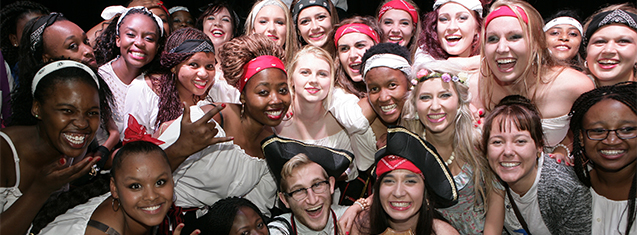
With a new format and residences mixing it up, the 2015 Stagedoor proved to be a success yet again, leaving Soetdoring and Kagiso with the spoils of victory.
Stagedoor (the annual first-year residence stage and serenade competition) saw a change of format this year where residences were combined to perform in a few number of outdoor venues for rotations.
Prior to this, Residence CoRC Cultures expressed much concern regarding the co-operation that might (or might not) be achieved with working with other residences. These were all early stage fears. However, as their preparations progressed there seemed to be a glint of light at the end of many groups’ tunnels.
Seven diverse and combined groups made it through to final, namely;
• Vishuis and Tswelopele,
• Karee and Armentum,
• Sonnedou and NJ van der Merwe,
• Soetdoring and Kagiso,
• Roosmaryn and Vergeert-My-Nie,
• Villa Bravado and Madelief, and
• and Veritas and Marjolein.
The finals proved that the efforts and sleepless nights of RC Cultures, first-years, composers, and other behind-the-scenes contributors can really make any situation work.
As always, the crowd was blown away by the musical and vocal talent of first-years, as some compositions gave the audience goose bumps, leaving them asking for more. All in all, the evening created a frenzy, causing residences to interact whereas they would have never done so before.
According to the Student Affairs’ Arts and Culture office, the aim behind the new format was to break the barriers between residences. Arts and Culture were also pleased as to with how the RCs worked around accommodating their partners and ensuring maximum co-operation, despite some challenges.
As the night neared its closeclosing, residences were chanting their names and showing their pride in their first years’ performances.
2015 Stagedoor final results:
1. Soetdoring and Kagiso
2. Roosmaryn and Vergeet-My-Nie
3. Vishuis and Tswelopele